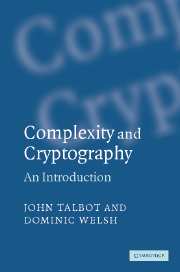Book contents
- Frontmatter
- Contents
- Preface
- Notation
- 1 Basics of cryptography
- 2 Complexity theory
- 3 Non-deterministic computation
- 4 Probabilistic computation
- 5 Symmetric cryptosystems
- 6 One way functions
- 7 Public key cryptography
- 8 Digital signatures
- 9 Key establishment protocols
- 10 Secure encryption
- 11 Identification schemes
- Appendix 1 Basic mathematical background
- Appendix 2 Graph theory definitions
- Appendix 3 Algebra and number theory
- Appendix 4 Probability theory
- Appendix 5 Hints to selected exercises and problems
- Appendix 6 Answers to selected exercises and problems
- Bibliography
- Index
10 - Secure encryption
Published online by Cambridge University Press: 06 July 2010
- Frontmatter
- Contents
- Preface
- Notation
- 1 Basics of cryptography
- 2 Complexity theory
- 3 Non-deterministic computation
- 4 Probabilistic computation
- 5 Symmetric cryptosystems
- 6 One way functions
- 7 Public key cryptography
- 8 Digital signatures
- 9 Key establishment protocols
- 10 Secure encryption
- 11 Identification schemes
- Appendix 1 Basic mathematical background
- Appendix 2 Graph theory definitions
- Appendix 3 Algebra and number theory
- Appendix 4 Probability theory
- Appendix 5 Hints to selected exercises and problems
- Appendix 6 Answers to selected exercises and problems
- Bibliography
- Index
Summary
Introduction
We have seen two possible methods for secure encryption so far, but both had serious problems.
The one-time pad in Chapter 5 offered the incredibly strong guarantee of perfect secrecy: the cryptogram reveals no new information about the message. The drawback was that it required a secret shared random key that is as long as the message. This really presents two distinct problems: first the users need to generate a large number of independent random bits to form the pad and, second, they need to share these bits securely.
The public key systems built on families of trapdoor functions in Chapter 7 provided an ingenious solution to the problem of sharing a secret key. They also offered a reasonable level of security under various plausible intractability assumptions. However, this security was framed in terms of the difficulty Eve would face in recovering a message from a cryptogram. This is significantly weaker than perfect secrecy. It is extremely easy for Eve to gain some information about the message from the cryptogram in a system such as RSA. For instance if the same message is sent twice then Eve can spot this immediately.
Information
- Type
- Chapter
- Information
- Complexity and CryptographyAn Introduction, pp. 203 - 228Publisher: Cambridge University PressPrint publication year: 2006
